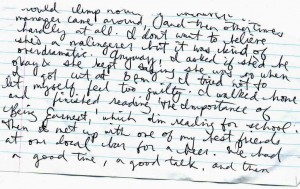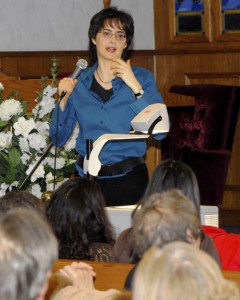 Poizner had me send some writing samples before our meeting. Rebecca Payne/Gleaner News.
Poizner had me send some writing samples before our meeting. Rebecca Payne/Gleaner News.
My initial skepticism about graphology, what seemed to me like a quaint Holmsian practice about as accountable as phrenology, quickly eroded after I sat down across from Annette Poizner. She started telling me things about myself that I’d never admit to anyone. Then she told me what section of the newspaper I read first.
In fact, about a minute into our discussion, I was so taken aback by what she was saying I blurted out, “Who, me?” It was almost uncomfortable at some points, and I found myself blushing more than once.
Her goal seems to be to debunk the conception of graphology in North America. “Unfortunately graphology has been put into sort of a cult label. Graphology is a clinical tool, it’s not tea leaf reading,” she said.
The Annex-based social worker’s Mar. 10 lecture at OISE (252 Bloor St. W.), ‘The Psychology of Handwriting” is an introduction to the principles of graphology, which will be demonstrated using handwriting samples written by well-known public figures, including Michael Jackson, Robert Redford, and Princess Diana.
Before our meeting, Poizner had me send her my handwriting samples—a page-long description of the events of a particular day; ten early childhood memories, to be recalled off the the top of my head; and a drawing of a tree.
These materials are the basis for Poizner’s ‘projective assessment,’ a discipline “that allows clinicians to learn about personality by analyzing the client’s drawings, written material, or other behaviors.”
Animated and captivating when she speaks, Poizner’s expressive gesticulations only make her more engaging. She’ll pantomime anything to get her point across; she does so, using her tall, lanky frame, with aplomb.

Poizner speaks to a crowd. Photo Courtesy David Morris.
Poizner first encountered graphology in her early twenties, when she was in Israel and had her handwriting analyzed. “It blew me away,” she said of the formative experience. She then hired a clinical graphologist and spent three hours a day in private study with him in Jerusalem.
She went on to do a second undergraduate degree in psychology at York University, and then her Master of Science degree in social work at Columbia University in New York.
She then completed a Doctorate of Education specializing in Counselling Psychology from the University of Toronto. Her dissertation examined the use of graphology as a psychotherapeutic tool.
Poizner credits her dissertation supervisor at OISE for taking her on. “It’s an interesting story that I found a dissertation supervisor who was willing to do this dissertation with me. She was really great. It’s hard to explore these off the beaten track things, so it’s a testimony to creative, interesting, innovative professors at this local institution,” said Poizner.
“Would I be able to do this in a scientific way? What I did for my research was qualitative research. You do the process with people and then you interview them and you say ‘Was there value in it, was there meaning in it? Accuracy? What did you think of the therapeutic potential of getting this kind of information on the basis of your handwriting?’”
Poizner describes my writing as simplified, and says I write like a writer. “It’s almost like it dances along the line. Connecting ‘i’ dots like that. My teacher would always say, ‘Idiots do not connect their ‘i’ dots.’ What are you doing so often in your handwriting? Your handwriting is more of a movement—flowy handwriting. [Your] interests just keep moving, like waves.”
When I ask Poizner if what she’s told me about myself could be dependent on the fact that my handwriting sample contained influential memories, she quickly rebuffed the idea: “It can’t be from your memories, because your memories look like a person who isn’t very good at anything, except for swimming, and she doesn’t really listen, so it couldn’t be that she could finish school and work successfully in jobs … it’s not in your memories, eight out of ten of your memories are reflecting an old map that says ‘I am not so good at stuff.’”
Poizner also insists that graphology alone does not comprise an assessment. “I will only talk about projective assessment, of which handwriting is one of them, you don’t use one alone … Any time psychological tests are used they do something called triangulation. Nobody gives you one test and says, ‘Oh, here’s your results’ on the one test, because any one test has limits to its reliability or validity. So what you do is you triangulate the data … You would be irresponsible to use it alone.”
My meeting with her was an intimate, affecting event. Being a psychotherapist, Poizner is necessarily intuitive and empathetic, but after I’d turned off my recorder and put on my coat, she walked me out of her office asking me about school, and where I hoped to direct my life. I couldn’t help but feel that it was one of those moments in life where you have to take heed of what’s being given to you, where it’s better to stop asking questions and graciously receive the gift.

3 responses so far ↓
1 Edith K. Leslie // Mar 8, 2011 at 9:59 pm
Dear Annette,
It is wonderful to hear that you are speaking about graphology. We need more people like you who have a solid education and are therefore more easily accepted by the general public when you present this much doubted, even ridiculed topic of graphology. A graphologist myself, I first studied Klages in my native Germany and have not stopped learning, analyzing, writing and translating since then. Graphology is a fascinating subject and it is most certainly valid. Some years ago I had the pleasure of hearing one of your lectures, and I am glad to see that you are still “making waves!”
2 Toby Kraman // Mar 9, 2011 at 12:34 pm
Yes, she is a gift. Annette is brilliant, caring and a very fine person. She is a personal friend and I have heard her speak – you will be engaged, challenged, informed and delighted. Don’t miss this talk if you can. Good luck Annette!
3 Isaac Mozeson // Mar 9, 2011 at 2:15 pm
Star Sister:
I take pride in what Nov. 20 people like you can do with the universe’s great secrets
that are hiding in plain sight.
I want to attend the talk tomorrow, but it depends on Melody. I not only want to discover much from you, I want to see you without your sunglasses.
So I’ll be the guy yelling, “Take ’em off !”